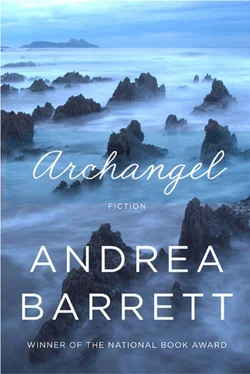“He gives all our names,” Arnold said, holding the book close to his lantern, “and then describes where we worked, the Bernese Alps and the Rhône Valley, the glaciers of the Grindelwald and much of course about the glacier of the Aar and what we did there …”
He smiled, and so, after a second, did the professor. Odd indeed to hear named the places where, after much happy investigation, he’d grasped the nature of glacial movement and formulated the idea of an Ice Age. The surface of Europe , he’d written somewhere, adorned before by a tropical vegetation and inhabited by troops of large elephants, enormous hippopotami, and gigantic carnivora, was suddenly buried under a vast mantle of ice, covering alike plains, lakes, seas, and plateaus. Upon the life and movement of a powerful creation fell the silence of death …
The nearest students, some still munching on lemon cake, watched the constellations climb over the edge of the ocean. What stood out, as Arnold read a few sample paragraphs out loud, were the cunning experiments, the colored liquids they’d poured into holes to measure the speed of the seepage through the network of fissures below. The facts but not the feeling of those blissful days. Once, hearing a sound as loud as a gunshot, he’d held his hand to the living ice and felt the birth of a new crevasse. Once he’d built a sturdy tripod over an open well in the glacier, suspended from it a board tied to two strong ropes, and had his friends drop him down the hole, so that he might inspect from his spinning seat the walls’ blue laminations. The book described their shelter, built from a boulder at the glacier’s edge, but not the feeling of five of them snugged inside like pencils in a tin, talking quietly about someday establishing a permanent summer school for the study of natural history.
“Thirty years late,” he said, as if Arnold might have followed his train of thought, “but we finally managed it.” Had he already said that, had he and Arnold already told these stories about their work on glaciers to these same students? Always, these days, he repeated himself, his only question — was this a fresh audience? — itself a repetition. Even the worry that he repeated himself repeated.
“It credits you,” Arnold announced, “well, us”—he lowered his voice modestly—“with introducing the idea of glaciers as a great geological agent sculpting the landscape. And you with proving, during your visit to Great Britain, that the mountains of Scotland and Wales showed equal evidence of having been molded by an ice sheet.”
“A fine trip,” the professor said, aiming his voice across the fire. “One of the best.”
“A triumph,” Arnold agreed, adding, “There’s even a section about the parallel terraces of Glen Roy.”
“There, at least,” the professor said, “I convinced Mr. Darwin of something.”
“Tell us,” said his wife, who had just returned after helping organize the removal of the plates. Countless times she’d encouraged him like this at dinner parties, watching while the wealthy industrialists from Boston or New York reached for their wallets. So had this very island come to him.
“Mr. Darwin,” he said, “when he was young, contended that those terraces represented ancient beaches, left behind from a time when the sea pushed its way farther inland and the valley was essentially a fjord. I simply noted the obvious: that the Scotch Highlands exhibit to perfection all the traces of glacial action. Polished surfaces, striated and marked by grooves and furrows; lateral moraines bordering the valleys and transverse moraines crossing them; boulders sitting by themselves. Anyone could see that a meltwater lake had once filled the area, dammed by a wall of ice and rubble, and that the parallel terraces represented the lake’s different levels. Mr. Darwin wrote me, after I published my explanation. He said that as soon as he read it, he knew I was right.”
A few yards to his left, the diminutive young woman with the improbably vigorous hair — he’d paired her with Henrietta; was she called Iris? — said, “I didn’t know that you and Mr. Darwin were ever friendly enough to talk.”
Was she being sarcastic? Perhaps what he heard as an edge to her voice was simply curiosity; after fourteen years of opposing Darwin’s theories, his opposition itself had grown famous. “Mr. Darwin and I,” he explained, “corresponded when we were younger about our shared interests.” Overhead a cloud bit into the edge of the moon. “And indeed I felt lucky to know him, and pleased when he inscribed a copy of his book to me.” Which, Darwin claimed in his letter, had not been sent “out of a spirit of defiance or bravado.” Although within the book he’d found several places where Darwin had used his own work against him.
Calmly, he continued, “He’s widely acknowledged to be one of Great Britain’s best naturalists, and I don’t dispute that. His work on coral reefs and barnacles shows skill and care and the narrative of his long voyage is a compendium of useful observations. It’s a shame he’s thrown all that away to chase such a wrongheaded theory.”

THE BOLD QUESTION Daphne asked about Mr. Darwin was, Henrietta knew by then, more typical than not; Daphne was surprisingly self-assured. She spoke to the teachers as if she were one of them, asked questions without raising her hand, rose from her seat in the dining hall and walked calmly to the professor’s table to confirm an idea she’d had. In the laboratory, where she and Henrietta worked at the same dissections and experiments, their notebooks looked like they were taking two different courses. Henrietta did as she’d learned at Oswego: neat ruled columns, numbered lists of observations, modest questions framed without any trace of personality, and in such a way that they might be answered. The “I,” Mr. Robbins had said, has no place in scientific study . Daphne’s pages seemed, in contrast, to be filled with everything Henrietta had expunged. Scores of drawings filled the margins, everything from fish eggs to the fringed feelers of the barnacle’s waving legs. Describing a beach plum’s flowering parts, she broke into unrelated speculations — when an individual polyp of Laomeda geniculata dies, does it affect the entire compound creature? — circled these darkly, and then drew arrows from there to cartoons of the professor.
She had grown up, Henrietta learned, on a small farm in a hilly part of central Massachusetts. Her family kept an apple orchard and also some sheep, a vegetable garden, a grove of maple trees tapped for syrup. Her chaotic, lively notebook, in which she wrote down whatever occurred to her, was only the latest in a long series. She’d started writing for a local magazine when she was still in school, little articles about common plants and animals, and although for five years now she’d had a teaching job at a coeducational academy, she continued writing, sneaking back into the empty study room to work after everyone else was asleep. Recently she’d started describing insect pests.
“The potato worm, the pickle worm, the cabbage worm,” she told Henrietta. “All those hungry grubs and borers and maggots chewing up whatever we try to grow in our gardens and orchards. Teaching is a perfectly fine way to make a living, but — a person must have a project of her own, don’t you think?”
Henrietta nodded, abashed. Until now she’d thought that finding a job was by itself a huge accomplishment. In just a few weeks she would meet her first class, teach her first lessons without supervision. The prospect of simply completing those tasks each day had seemed formidable enough.
Читать дальше













